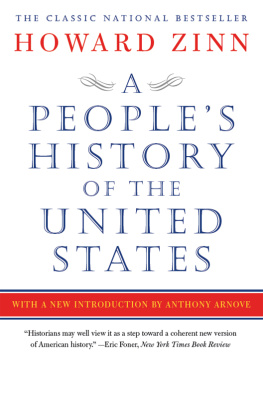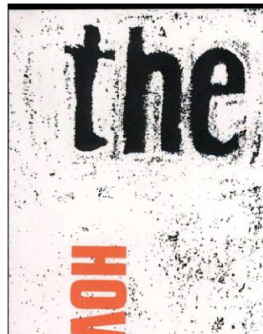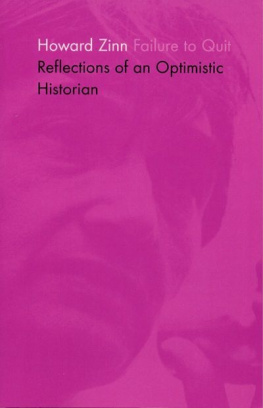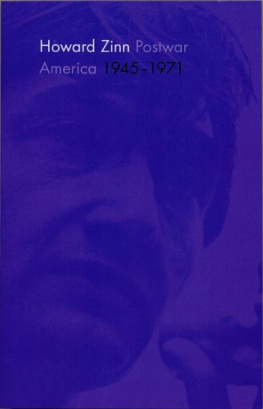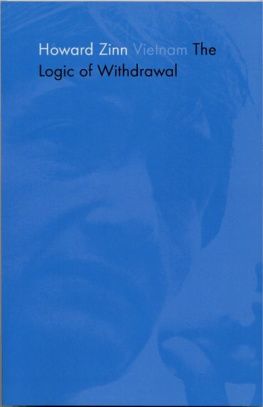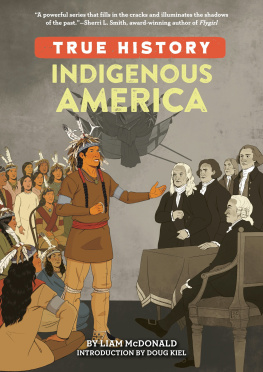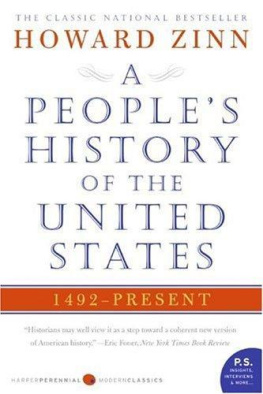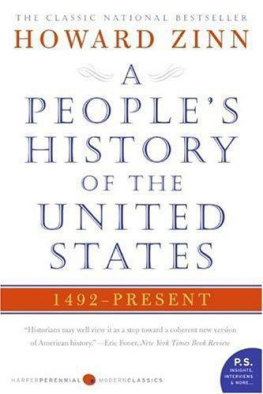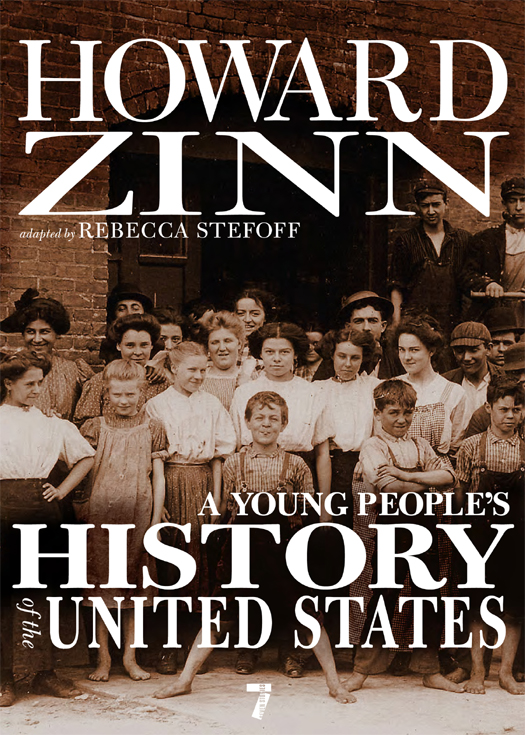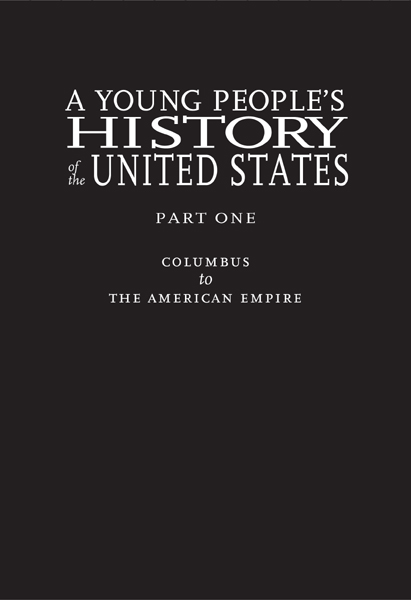
Copyright 2007, 2009 by Howard Zinn
Previously published as a two volume set
All rights reserved. No part of this book may be reproduced, stored in a retrieval system, or transmitted in any form or by any means, including mechanical, electric, photocopying, recording, or otherwise, without the prior written permission of the publisher.
SEVEN STORIES PRESS
140 Watts Street, New York, NY 10013
www.sevenstories.com
In Canada
Publishers Group Canada
559 College Street, Suite 402, Toronto, ON M 6 G IA 9
In the UK
Turnaround Publisher Services Ltd.
Unit 3, Olympia Trading Estate, Coburg Road, Wood Green
London N 22 6 TZ
In Australia
Palgrave Macmillan
1519 Claremont Street, South Yarra, VIC 3141
College professors may order examination copies of Seven Stories Press titles for a free six-month trial period. To order, visit http://www.sevenstories.com/textbook or send a fax on school letterhead to (212) 226-1411.
Library of Congress Cataloging-in-Publication Data
Stefoff, Rebecca, 1951
A young peoples history of the United States / Howard Zinn ; adapted by Rebecca Stefoff.Seven Stories Press 1st ed
p. cm.
Previously published in 2 volumes: 2007.
eISBN: 978-1-58322-945-3
I. United StatesHistoryJuvenile literature. I. Zinn, Howard, 1922- Peoples history of the United States. II. Title.
E 178.3. S 735 2009
2009006055
v3.1_r1
Contents
To all the parents and teachers over the years who have asked for a peoples history for young people, and to the younger generation, who we hope will use their talents to make a better world.

Thanks to Dan Simon, of Seven Stories Press, for initiating this Young Peoples History and to Theresa Noll of Seven Stories Press, for steering the project so carefully through its various stages.

A special appreciation to Rebecca Stefoff, who undertook the heroic job of adapting A Peoples History for young readers.
Introduction
EVER SINCE my book A Peoples History of the United States was published twenty-five years ago, parents and teachers have been asking me about an edition that would be attractive to youngsters. So I am very pleased that Seven Stories Press and Rebecca Stefoff have undertaken the heroic job of adapting my book for younger readers.
Over the years, some people have asked me: Do you think that your history, which is radically different than the usual histories of the United States, is suitable for young people? Wont it create disillusionment with our country? Is it right to be so critical of the governments policies? Is it right to take down the traditional heroes of the nation, like Christopher Columbus, Andrew Jackson, Theodore Roosevelt? Isnt it unpatriotic to emphasize slavery and racism, the massacres of Indians, the exploitation of working people, the ruthless expansion of the United States at the expense of the Indians and people in other countries?
I wonder why some people think it is all right for adults to hear such a radical, critical point of view, but not teenagers or sub-teenagers? Do they think that young people are not able to deal with such matters? It seems to me it is wrong to treat young readers as if they are not mature enough to look at their nations policies honestly. Yes, its a matter of being honest. Just as we must, as individuals, be honest about our own failures in order to correct them, it seems to me we must do the same when evaluating our national policies.
Patriotism, in my view, does not mean unquestioning acceptance of whatever the government does. To go along with whatever your government does is not a characteristic of democracy. I remember in my own early education we were taught that it was a sign of a totalitarian state, of a dictatorship, when people did not question what their government did. If you live in a democratic state, it means you have the right to criticize your governments policies.
The basic principles of democracy are laid out in the Declaration of Independence, which was adopted in 1776 to explain why the colonies were no longer willing to accept British rule. The Declaration makes it clear that governments are not holy, not beyond criticism, because they are artificial creations, set up by the people to protect the equal right of everyone to life, liberty, and the pursuit of happiness. And when governments do not fulfill this obligation, the Declaration says that it is the right of the people to alter or abolish the government.
And, if it is the right of the people to alter or abolish the government, then surely it is their right to criticize it.
I am not worried about disillusioning young people by pointing to the flaws in the traditional heroes. We should be able to tell the truth about people whom we have been taught to look upon as heroes, but who really dont deserve that admiration. Why should we think it heroic to do as Columbus did, arrive in this hemisphere and carry on a rampage of violence, in order to find gold? Why should we think it heroic for Andrew Jackson to drive Indians out of their land? Why should we think of Theodore Roosevelt as a hero because he fought in the Spanish-American War, driving Spain out of Cuba, but also paving the way for the United States to take control of Cuba?
Yes, we all need heroes, people to admire, to see as examples of how human beings should live. But I prefer to see Bartolom de Las Casas as a hero, for exposing Columbuss violent behavior against the Indians he encountered in the Bahamas. I prefer to see the Cherokee Indians as heroes, for resisting their removal from the lands on which they lived. To me, it is Mark Twain who is a hero, because he denounced President Theodore Roosevelt after Roosevelt had praised an American general who had massacred hundreds of people in the Philippines. I consider Helen Keller a hero because she protested against President Woodrow Wilsons decision to send young Americans into the slaughterhouse of the First World War.
My point of view, which is critical of war, racism, and economic injustice, carries over to the situation we face in the United States today.
More than five years have elapsed since the most recent edition of A Peoples History, and this young peoples edition gives me an opportunity, in the final chapter of Volume Two, to bring the story up to date, to the end of 2006, halfway through the second administration of George W. Bush, and three and a half years after the start of the U.S. invasion of Iraq.
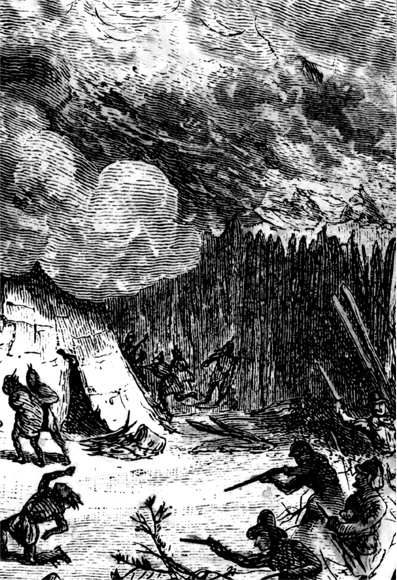
Captain Masons attack on the Pequots fortified village, 1637.


